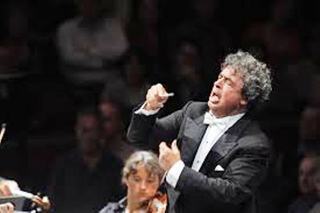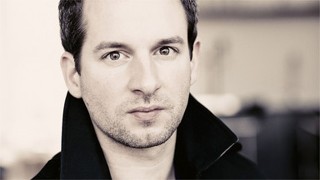|
Back
Russian Ice and French Animation New York
David Geffen Hall, Lincoln Center
05/17/2018 - & May 18, 19, 22, 2018
Johannes Brahms: Tragic Overture, Opus 81
Felix Mendelssohn: Piano Concerto No. 1 in G Minor, Opus 25
Dmitri Shostakovich: Symphony No. 5 in D Minor, Opus 47
Bertrand Chamayou (Pianist)
New York Philharmonic Orchestra, Semyon Bychkov (Conductor)

S. Bychkov (© Chris Christodoulou)
“Music can go further than poetry, for it is capable of grasping the most secret memories of the inner world, which are inaccessible to words.”
Friedrich Hegel, paraphrased by Milan Kundera in The Curtain
The quote above should apply directly to Dmitri Shostakovich’s most popular symphony, the Fifth. So many million words have “described” the piece in terms of history, politics, Stalinism, esoteric meanings that one forgets that this is–above all–a piece of great music. And when Semyon Bychkov conducts the work, even in a flawed New York Philharmonic performance, one begins to have intimations of those “secret memories.”
Mr. Bychkov is ever a welcome visitor here. He is of course a vital conductor of his native Russian music. But unlike Gergiev, who adds thunder and lightning to every piece he conducts, Maestro Bychkov has a less incessantly gut temperament.
Not that he made the Fifth last night into a cerebral (or even Hegelian) structure. When it came to the blazing excitement of the finale, or the abrupt changes of the first movement or the woodwind solos in the slow movement, Mr. Bychkov was not afraid to bring out all the character needed.
At the same time, I have rarely heard a more personal performance. In fact, one has the feeling Mr. Bychkov wanted to make this not a “message symphony”, but a piece of pure music-making.
That first movement was one example. There are those who give it a heavy performance, a tenuous reading until the grand climaxes. Mr. Bychkov seemed to frame the whole Moderato with a kind of eerie grace. Yes, tempos and colors changed, but the conductor was not looking for surprises or question. Rather, the emotional explosions were…well, not repressed, simply part of the Shostakovich landscape.
Virtually all readings make the Largo third movement the heart-rending centerpiece, and Mr. Bychkov was suitably careful to follow the instructions.
Yet for this listener, the second movement–the de rigueur Shostakovich scherzo–was totally altered and all the more absorbing. We expect the mordant, the wicked, the disjointed Picasso circus. Instead, Mr. Bychkov took the tempo fractionally slower (and the Trio slower still). The humor was not that of the cinematic Joker, but humor behind the scenes. The comedy was intimated, the cellos bowed hard on their strings, the piece was less spontaneous than deliberate.
At first this was disconcerting. And then, the scherzo become something icy, something cold. Rather than give the solos full flight, he emphasized the Mahler tempos in the strings.
The result was less Shostakovich sneering at the audience, but Shostakovich whispering frightening notes. The composer’s blood had been drained, and we heard an elegant skeleton-dance.
Brrrrr...
The opening work last night was Brahms` Tragic Overture, which is hardly immediately endearing. Mr. Bychkov endowed partly with nobility, but could never exactly retain Brahms’ conventions. The composer refused to say which particular tragedy he had in mind, but it was probably something but Goethe or Schiller, as most composers did in that time.

B. Chamayou (© Marco Borggreve)
The piano soloist, Bertrand Chamayou, made his New York Phil debut last night, with a curious choice. Nothing is wrong with Mendelssohn’s First Piano Concerto. In fact, it is a delightful piece and any pianist who can get through the digital tantrums of the two outer movements deserves the same kind of accolades as Mr. Chamayou.
Mendelssohn simply didn’t give a chance for any pianist to screw up. To play those endless 16th notes at a Molto allegro con fuoco tempo is a chore, and the ending coda is kinda impossible.
I’ve never heard it played here, but any of our regulars would have a terrific time showing just how dazzling they can be.
Mr. Chamayou, though, was unknown to NY Phil audiences, and the result was 15 minutes of elfin, scintillating, light, clear sounds, while the conductor prudently kept the orchestra to a minimum.
One would think that Mr. Chamayou’s technique would be sufficient for success, and it was. A woman sitting near me asked how I liked it, and my only reply was, “What was there not to like?”
Next time, hopefully, Mr. Chamayou will choose music which is not merely likeable, but combines head, heart, fingers, perhaps even with those Hegelian secret memories.
Harry Rolnick
|